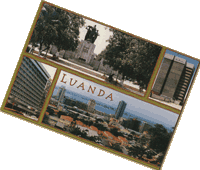“How to deal with violent
memories…”

Dear Deolinda,
 Your friend Loid’Ana’s story dovetails yours in some ways, as she and her family were also swept up into the atrocities that continued in your homeland for so many years.
Your friend Loid’Ana’s story dovetails yours in some ways, as she and her family were also swept up into the atrocities that continued in your homeland for so many years.
She also acquired a whole impressive set of credentials following your growing-up days together in Angola. She was another of the scholarship students sent to Portugal for studies at the Seminario. After that, she returned to teach at the Quessua mission. And in Huambo--where a statue honors you for the role you and other women played in the fight for independence—she lived with her parents for a year in the early 60’s while they were assigned to the Dondi mission.
In 1961, her father—whom you remember was a highly respected pastor--was arrested and sent to prison in Luanda, and innocently became a part of that whole reactionary era of reprisals and killings and general anarchy that were the inevitable outcome of years of colonial domination all over the African continent.
Even with the family concerns back at home, Loid’Ana joined others from your youth group who ended up continuing their studies in other parts of the world, because it was a foregone conclusion that you as educated young Angolans would be identified by the Portuguese as precipitators of rebellion. It was not safe for you to remain in Angola.
So off she went to New York for studies at NYU, on to Ohio Northern University for more studies, and then marriage to Serafim de Sousa e Santos. Together, they had five children.
In 1971, they moved to Philadelphia, and she and the family joined Arch Street United Methodist Church, a congregation with a history of strong social justice outreach. In that church she was confronted by an example of the strong opposition prevailing in the U.S. against Angola at that time, so strong that the church received a bomb threat, and the FBI had to be called in.
It was at Arch Street Church that I first met up with Loid’Ana. She learned that I was living in nearby Baltimore, Maryland, and sent me a last-minute invitation to attend an ambitious plan to organize a “Volunteers in Mission” trip back to Angola to help rebuild so many churches and schools and other mission buildings damaged or destroyed by the wars.
Like her father, Loid’s strong interest is history. Her ambition is to resurrect the ecumenical journal, O Estandarte, founded by her father. So many files were lost during the wars, but she thinks she knows where to get old editions of the newspaper that recorded much of the history of Protestant work in Angola. She’s planning to do an anthology of the writers, and especially involve young people in the project. It will be a reminder to them of the witness of generations before them—faithful within the church, devoted to their country, and free at last.
Her parents were such a strong influence in her life. Her dad lived to be 100; her mother, at home in Angola, continues to participate in Loid’Ana and Mimi’s lives in Philly via Skype and other technologies unheard of in your day, Deolinda.
I asked Loid’Ana about the location of Avenida Deolinda de Rodrigues in Luanda. She asked her mother, who wasn’t sure about the Avenue, but she knew the exact location of Rua Deolinda de Rodrigues. It’s the highway from Catete that begins at Largo 28 de Maio, at the monument to Agostinho Neto.
Over the years, Loid’ and Serafim and the family traveled back and forth to Africa. After independence, they became part of newly elected President Neto’s dream team for Angola, offering jobs to Angolans living in far-flung parts of the globe who were willing to return and help build a new Angola.
Serafim took a job at the University of Angola in a project subsidized through UNESCO, while Loid’Ana poured her creative energy into an international programming job she loved. With her sense of history, and supported by the master’s degrees and other training she had pursued during the years abroad, she was able to make a valuable contribution to the new society.
Of course you remember Bebiana de Almeida, who with Loid’Ana was a day care teacher when we all worked together in Luanda. They both held promising positions as the administration responded to the needs of people who had for so long lived in poverty under a repressive regime. Some of the outreaches were funded through the United Nations. And, in fact, Bebiana went on to serve as an official translator of Portuguese to English in the United Nations in New York.
Listening in on our conversation around Loid’Ana’s kitchen table as the stories continued to pour forth, you would have been amazed, and in fact your spirit was a presence among us.
I was dumbfounded when Loid’ talked about how many Angolans of the various political parties had immigrated to the Philadelphia area. She mentioned someone from the FNLA--the opposition party headed by Holden Roberto that engaged the MPLA in fierce battles at the region of the Congo described in your ill-fated last diary entries. Loid’Ana heard that the FNLA man’s brother, now residing in Philly, bragged: “I was the one who killed Deolinda.”
